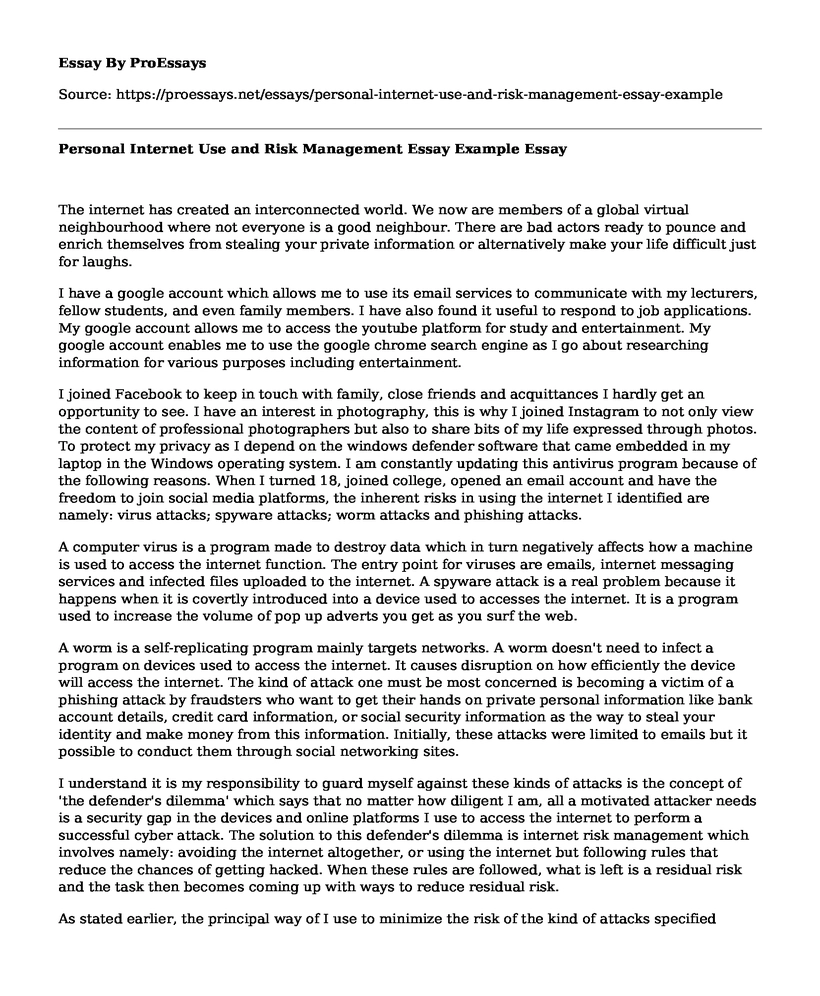The internet has created an interconnected world. We now are members of a global virtual neighbourhood where not everyone is a good neighbour. There are bad actors ready to pounce and enrich themselves from stealing your private information or alternatively make your life difficult just for laughs.
I have a google account which allows me to use its email services to communicate with my lecturers, fellow students, and even family members. I have also found it useful to respond to job applications. My google account allows me to access the youtube platform for study and entertainment. My google account enables me to use the google chrome search engine as I go about researching information for various purposes including entertainment.
I joined Facebook to keep in touch with family, close friends and acquittances I hardly get an opportunity to see. I have an interest in photography, this is why I joined Instagram to not only view the content of professional photographers but also to share bits of my life expressed through photos. To protect my privacy as I depend on the windows defender software that came embedded in my laptop in the Windows operating system. I am constantly updating this antivirus program because of the following reasons. When I turned 18, joined college, opened an email account and have the freedom to join social media platforms, the inherent risks in using the internet I identified are namely: virus attacks; spyware attacks; worm attacks and phishing attacks.
A computer virus is a program made to destroy data which in turn negatively affects how a machine is used to access the internet function. The entry point for viruses are emails, internet messaging services and infected files uploaded to the internet. A spyware attack is a real problem because it happens when it is covertly introduced into a device used to accesses the internet. It is a program used to increase the volume of pop up adverts you get as you surf the web.
A worm is a self-replicating program mainly targets networks. A worm doesn't need to infect a program on devices used to access the internet. It causes disruption on how efficiently the device will access the internet. The kind of attack one must be most concerned is becoming a victim of a phishing attack by fraudsters who want to get their hands on private personal information like bank account details, credit card information, or social security information as the way to steal your identity and make money from this information. Initially, these attacks were limited to emails but it possible to conduct them through social networking sites.
I understand it is my responsibility to guard myself against these kinds of attacks is the concept of 'the defender's dilemma' which says that no matter how diligent I am, all a motivated attacker needs is a security gap in the devices and online platforms I use to access the internet to perform a successful cyber attack. The solution to this defender's dilemma is internet risk management which involves namely: avoiding the internet altogether, or using the internet but following rules that reduce the chances of getting hacked. When these rules are followed, what is left is a residual risk and the task then becomes coming up with ways to reduce residual risk.
As stated earlier, the principal way of I use to minimize the risk of the kind of attacks specified earlier, I keep my Windows Defender constantly updated. In addition to this measure, when it comes to emails, I never open emails from unknown people or sources. I also never open unsolicited emails from unknown sources because they may have links or attachments that have viruses or other attack programs mentioned earlier.
To protect myself from dangerous websites, my Google Chrome browser has installed in it a software called Adware which automatically blocks dangerous websites from which the attacks I previously mentioned may occur.
Other essential steps are that I never surrender personal information to websites on public computers, like those in the school public library or an internet cafe. This is because hackers may have installed spyware on them to record my passwords. When purchasing goods or services from websites on my laptop, I ensure that the check-out page is secured using HTTPS in the address line.
Conclusion
When it comes to reducing risk on social media networking sites, I never overshare personal information about myself. The kind of personal information I never submit to social media platform includes all my names, my social security number, my passport number or my credit card information. I also never accept friend requests from people I don't know. Additional risk management steps that I would consider for my use of the internet include setting up private internet connections more at home. A secured network is better to make sure that other people do not access a shared network because it is possible to go through history and acquire private information.
Cite this page
Personal Internet Use and Risk Management Essay Example. (2022, Oct 20). Retrieved from https://proessays.net/essays/personal-internet-use-and-risk-management-essay-example
If you are the original author of this essay and no longer wish to have it published on the ProEssays website, please click below to request its removal:
- Waterfall SDLC Paper Example
- Essay Sample on Network Security
- Paper Example on Joy Inc.: Building a Successful Organization in a Competitive, Tech-Driven World
- Essay Sample on Robots Replacing Humans: The Future of Work?
- Leadership: Transform Vision to Reality With Prudence & Skills - Essay Sample
- Essay Example on Army Leaders: Courage, Sacrifice, and Loyalty
- Cybercrime Investigative Techniques - Report Sample







